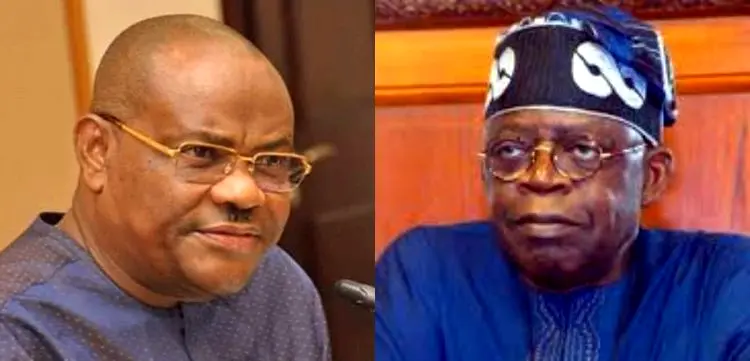Federal Capital Territory Minister Nyesom Wike has committed himself to spearheading President Bola Tinubu’s re-election campaign for the 2027 presidential race, while simultaneously clarifying his opposition to the state of emergency declared in Rivers State.
During a press briefing in the nation’s capital on Monday, the former Rivers State governor emphasized his determination to deliver electoral victory for the president, particularly in areas where Tinubu previously performed poorly. Wike confidently predicted that the FCT, where the president secured less than 10 percent of votes in the 2023 election, would become a stronghold for Tinubu’s 2027 campaign under his leadership.
“Are you not aware that he didn’t get up to 10 per cent here, FCT? But he will win here,” Wike declared to journalists, expressing unwavering confidence in his ability to transform the political landscape in favor of the incumbent president.
The FCT minister’s commitment extends beyond the federal capital, as he indicated his readiness to lead campaign efforts in Rivers State as well. When questioned about his role in the upcoming electoral cycle, Wike responded rhetorically, asking whether there was any doubt about his intentions to champion Tinubu’s candidacy in his home state.
Wike justified his support for Tinubu’s re-election by invoking regional political considerations, arguing that the South must retain the presidency in 2027. “Because I have said the South must produce the president,” he stated, framing his campaign commitment within broader geographical power-sharing arrangements that have characterized Nigerian politics.
However, the minister drew a clear distinction between his loyalty to the president and his stance on the controversial emergency rule imposed on Rivers State. Wike revealed that he would have opposed President Tinubu had he been consulted before the declaration of the state of emergency that suspended Governor Siminalayi Fubara and other state officials.
“If Mr President had called me, I wouldn’t have agreed to the State of Emergency,” Wike disclosed, emphasizing that his opposition to the measure remains consistent despite his overall support for Tinubu’s administration.
The FCT minister characterized the emergency declaration as a protective measure that prevented Fubara’s impeachment, rather than a punitive action. He suggested that the intervention actually saved the suspended governor from more severe political consequences that were imminent before federal intervention.
Addressing speculation about personal conflicts with Fubara, Wike denied having any direct dispute with his successor while suggesting that external forces had manipulated the suspended governor. “I don’t have crisis rather the governor, unknown to me, gave himself to be the tool for those who couldn’t fight me to fight me,” Wike explained.
The minister portrayed the ongoing political tensions in Rivers State as part of broader factional struggles within the Peoples Democratic Party, describing current developments as the work of “undertakers” who have created unnecessary crises within the opposition party.
Wike emphasized that only President Tinubu possesses the authority and information necessary to determine when the state of emergency should be lifted, indicating that he has not been involved in discussions about the duration or conditions for ending the emergency rule.
The FCT minister’s statements reflect the complex political dynamics surrounding Nigeria’s 2027 electoral preparations, as key figures position themselves for the upcoming campaign season. His dual role as a former opposition governor now serving in Tinubu’s cabinet illustrates the fluid nature of Nigerian political alignments as parties and individuals prepare for the next electoral contest.
Wike’s public commitment to leading Tinubu’s campaign signals the president’s strategy of leveraging cross-party support and regional influence to strengthen his re-election prospects across different geographical zones of the country.



















